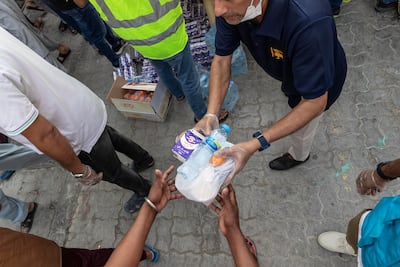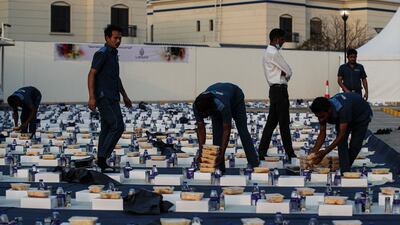Residents in Dubai wishing to distribute iftar meals to the public during Ramadan must first apply for permission, officials have said.
After a brief ban due to Covid-19 safety measures, giving food to those less fortunate is allowed but anyone doing so needs permission from Dubai's Islamic Affairs and Charitable Activities Department (Iacad).
This is because it must be clear if the donated food is safe to consume and ensures meals are being distributed to a variety of places.
During holy month, it is customary for Muslims to participate in charity work, giving food and money to help those less fortunate.

But officials have stressed that residents should not run charity campaigns or distribute iftar meals unless they are licensed to do so.
“People can apply to the department to get permission to distribute iftar meals. The person needs to mention which area he or she will distribute the meals to make the process more organised,” Mohammed Dahi, director of the Charitable Institutions, told The National.
“We don’t want people to go to one place in one time. By knowing which areas they are planning to go, we can guide others to go to another area to distribute iftar meals.”
People can visit the department’s website to apply for permission, or call 800600.
“The person must submit Emirates ID, location of the distribution and name and location of the restaurant that will supply the food,” Mr Dahi said.
People who distribute iftar meals without permission could be fined between Dh5000 to Dh10,000 ($1,360 to $2,722) or given a jail term ranging from 30 days to a year.
Mr Dahi added there were many types of charity but some are possible only during Ramadan, such as helping people break their fast by giving them water and food.
People are allowed to give free iftar meals to small groups of people they know and trust without permission, but they cannot run an entire donation campaign, either in person, on social media or messaging apps.
In January, existing laws on how money is donated were broadened to include food, supplies and medicine.
If people do not have a licence to distribute iftar meals, they can make charitable gestures in other ways, said Mr Dahi.
“People can donate to a licensed charity organisation in the UAE. There are some you can give money to, which goes towards a free meal for the less fortunate."
Iacad has issued permission for 22 iftar tents and more than 300 iftar tables this year, and also announced a group iftar for 1,000 people at Expo City Dubai.
Iacad's Ahmed Al Mansouri said the campaign was being held on the back of last year's success when more than 500 people gathered at the iftar table in Expo City.
“We will have representatives from different religions in the country at Al Wasl Plaza for iftar table on April 2 this year,” said Mr Al Mansouri. "It will represent the principle of moderation, wisdom, rejection of racism, tolerance and acceptance of others.
“We will have another iftar table in Expo City for 200 schools principals on April 9.”
The department will also organise Islamic lectures on site and at 2,300 mosques in the emirate.




















